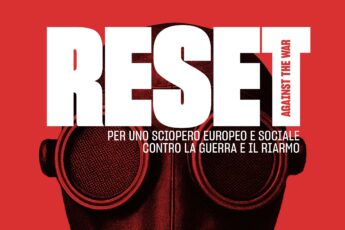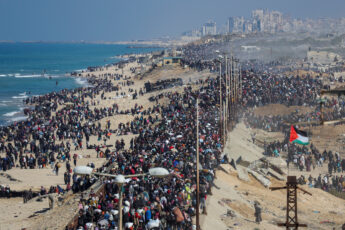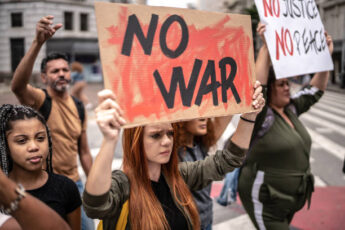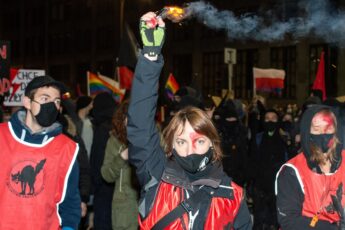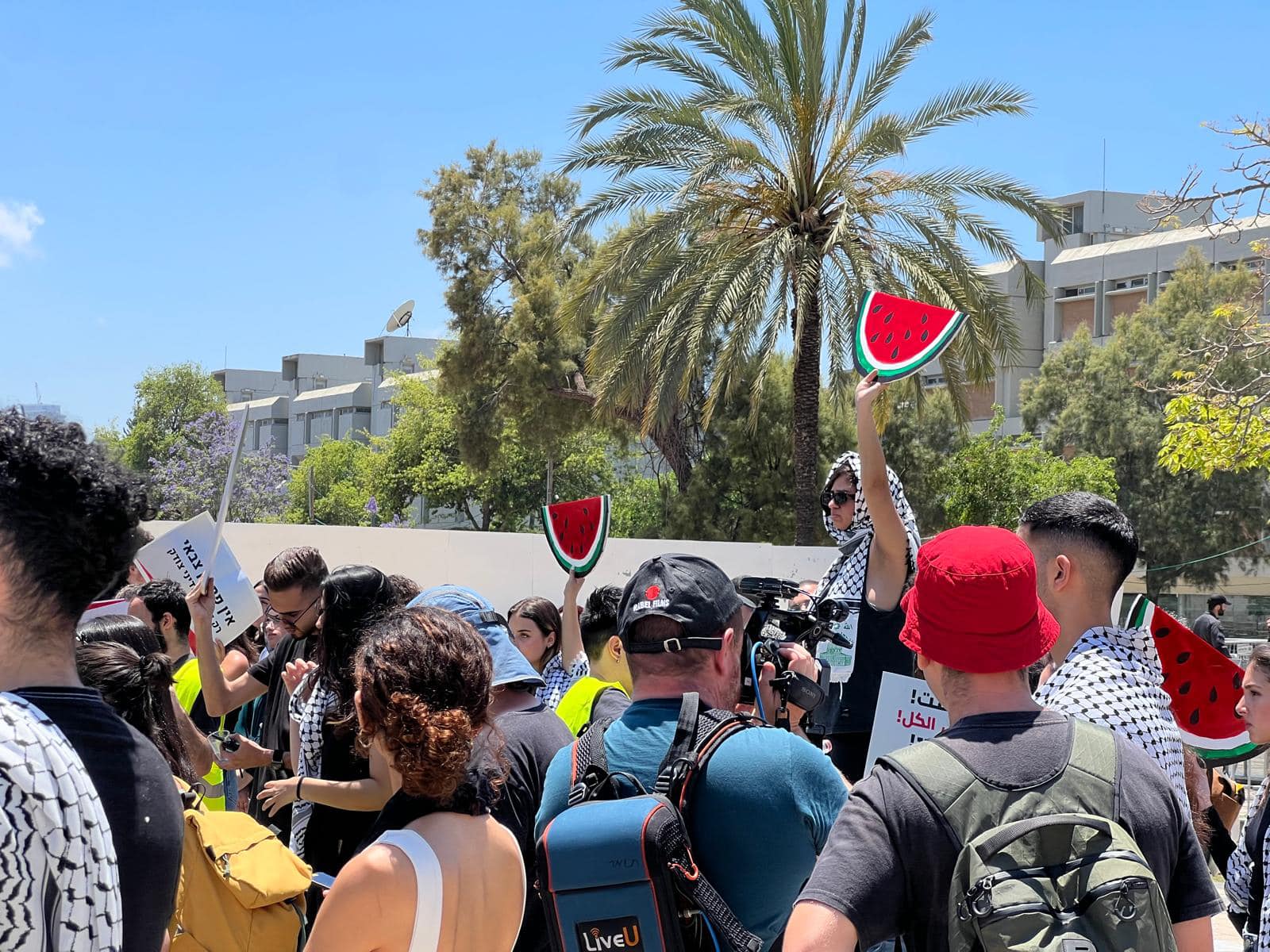
We publish this interview with David, a member of the Hadash party in Israel and a representative of the Hadash student group at Tel Aviv University, where last week, as in other Israeli universities, a one-hour strike and various initiatives against the war in Gaza were organized. In many universities in Europe and the United States, students have camped out and occupied campuses to say no to the war and to protest against the genocide that Israel continues to carry out (read our interviews from the University of North Carolina, City University of New York, with an organizer at the New School for Social Research, and from King’s College London). After the brutal attack on Rafah, student protests have also started to grow within Israeli universities, despite the brutal repression and isolation faced by anyone who speaks out against the Palestinian genocide.
How did the student’s protests against the Israeli offensive on Gaza start? What groups have been participating?
At the beginning of the war, I wanted to give a lecture at the university about students’ rights, but the university didn’t allow it. We had some professors who spoke out for Gaza, and they were shamed by the university. During the last semester, at Tel Aviv University, we organised some moments of mobilisation against the war, such as minutes of silence and a big Nakba ceremony on May 15th. Last Tuesday, after the horrific attack on Rafah, we organised a one-hour strike in all Israeli universities and colleges, together with the National Council of Palestinian Students, a national group that was set up in response to the Israeli war on Gaza to bring together all the Palestinian groups in the Israeli academy but has not been very active since. The plan was simply to sit together and talk about how we, as students, need to raise our voices against the war.
Here in Tel Aviv, we announced the strike and the fascist right opposed it by saying that “Hamas supporters” were going to demonstrate against them. After this happened, the president of the university called us and said “I know you are not the problem and don’t want to demonstrate violently. But I believe that the right-wing students are going to be violent in this thing, and I don’t have enough security. Therefore, I don’t have any choice but to call the police to enter the university”. We didn’t want the police to enter the university because we have fascist police, which means that they won’t go after the fascist right-wing protesters but only against the Palestinian and left-wing Jewish students. Therefore, we convinced the university that we would still do a strike but without gathering all the students in one place. We just made a strike, and the university allowed this to happen. Eventually, we had plenty of students who came where we told everyone to come. We spoke with them a bit, but nothing big. Tomorrow [yesterday, Tuesday, June 4], we plan to do the same thing. However, we only announced it to private groups of students, so the right wing and the university do not know about it.
Also, as Hadash, we plan to strike again on Wednesday, June 5 [today], which is the day when the Israeli army has occupied the Palestinian territories. We are going to bring little notebooks with testimonies from Gaza and from the Hebrew University in Jerusalem, which was the only university that allowed the strike to take place in this form. The university was able to completely secure the protest, even though Tel Aviv didn’t.
Did professors and workers at the university join the students’ protests?
In Tel Aviv, some professors of a group called “Academy for Equality”, who had already been involved in some of the things we have organised, went on strike with us. Two weeks ago, we had professors who came to support us and spoke at the Nakba ceremony. I think that was a very important step in the students’ struggle against the war on Gaza. Until that moment, students were very afraid to speak out against the war because they knew that it was very easy to be punished for what you said. At the beginning of the war, a lot of Palestinian students who posted on Instagram and Facebook against the war or in support of the people in Gaza were expelled from the university, and some of them were even sent to prison. But I think that the Nakba ceremony, which was the first big anti-war and pro-Palestinian action that we did on campus since the war started, gave a lot of people a new sense of power.
Were there any previous relationships between Israeli and Palestinian students, or was this the first joint mobilisation within the university?
First of all, it is very important to say that we are only active in Israel, not in the West Bank and the Occupied Territories. Under Israeli law, contacting Palestinian students from the West Bank and the Occupied Territories can lead to charges of communicating with foreign agents, which makes it a very difficult and dangerous thing to do. During the Nakba ceremony, we showed a recording of a student who managed to escape from Gaza to Cairo and told us her story. We also have some comrades who are helping people in the West Bank and in the South Hebron Mountains, but these are quite isolated cases that do not amount to a real connection, and this is something we should figure out how to do better.
For us in Hadash and the Communist Party, the need to build connections between Israelis and Palestinians has been very clear for more than a century now. This necessity is not recognised by other political groups in the same way, but we believe that our struggle must be a common struggle of Jews and Arabs coming together against a Zionist social system that is hurting everyone. This alliance began already when the Communist Party of Palestine was founded, and because they were real communists and they believed in real equality and a just society, they had no other choice but to work together, Jews and Arabs, because we are in this land, and we see how the system works against all of us equally – although it is worst for the Palestinians. But this system harms all of us, Jews, Arabs, Italians, and Germans—this is what real communists must think. Our alliance is based on real and deep ideological values. I believe this makes us stronger than other Jewish and Arab groups in Israel, which work on a moral level. They claim that the occupation is terrible, that the Palestinian people are very poor, and that the Israeli government is doing wrong. On the other hand, they feel that since they are moral people, we all should work together to help them end the occupation. I believe this is not deep enough, as morality can change easily when there is a certain ruler over the country. For example, 20 years ago, there were huge protests in Israel after the IDF killed about ten innocent civilians during an operation in which they claimed they were trying to kill some Hamas leaders. There were huge protests, and people went to the Supreme Court, and there was a huge debate around it. But now that we have a very fascist and populist government, which can change the morality of the majority of people, people really don’t care. People saw what happened in Rafah last Sunday, and they didn’t come out and say, “This is bad. This is not why I’m sending my children to the Army”. Thus, I think morality is not strong enough. You need to have real, very deep ideological values to make a real change. And I believe that is the strength we have in Hadash and in the Communist Party.
Is it possible to expect mobilizations in other universities in the country or the West Bank? Are you in contact with the university protests that are spreading around the world?
We have been talking to students in the United States and Europe, trying to build connections to raise the voices of Jews and Arabs working together inside Israel to end the war and recognise the Palestinian state. It is not always easy to make these connections because these protests are seen as anti-Semitic by Israeli society, which puts us in the position of being labelled by the fascists as terrorists working with anti-Semitic groups. I feel that no matter how much international pressure there is, the people here must first understand from within that something very deep has to change because only those who live here between the river and the sea will have the possibility to end this terrible war and this terrible occupation. But I also do think it is very important that we work together to end this war.
For the Israeli state, the pro-Palestinian protests in foreign universities are anti-Semitic. Anti-Semitism is a very easy populist tool here in Israel. Any judgement that goes against Netanyahu’s government is defined as anti-Semitism by the media, by the government, and by everyone in Israel. Even the decisions of the International Court are deemed to be anti-Semitism. This is how the Zionist idea controls the minds of the people here. They may say everyone is anti-Semitic and therefore they are illegitimate. Of course, this is nonsense. I am sure there are people in the student protests who do not have the best ideological values, and they might even be anti-Semitic, but surely not the majority of them. Look at all these Jewish movements: Jewish Students for a Ceasefire, or the Jewish Voice for Peace. The government linked very easily anything regarding anti-Zionism to anti-Semitism. We need to be careful about how we speak out about that.
Among the students’ demands in Europe and the US is the suspension or cancellation of agreements with Israeli universities for the development of military technologies. Some universities have accepted these demands. Have you heard about this? What do you think?
I think that boycotting Israeli universities, even though they are very much tied to the occupation and the military industry, is a problematic move from our side. Universities are the only places for leftists to speak out, and our fascist populist government would do everything — and they are doing it right now – to silence the universities and take away their power. For example, yesterday the National Student Council started a huge advertising campaign to promote a law that will make the university sack any professor who supports terrorism. But for them, supporting terrorism means speaking in solidarity with Gaza and saying that Zionism should end. Therefore, this international pressure is something that would help the fascist government. I agree that universities should end all their relations with the military industry. But if I try to be realistic, I don’t see that happening in Israel in the near future, unfortunately. Especially when it comes to the arms and the military industries, the universities receive a huge amount of money, both from Jewish and Zionist donors, and from selling the products themselves – something which the universities, both in Israel and abroad, will not lose so easily.
The struggle that I think has more possibilities and would help to do something here in the Israeli universities is to say to the Israeli universities: “If you want to have academic relations, you have to promise all your students and all your professors full freedom of speech and demonstration”. Because when leftist Jewish and Palestinian professors and students here will have real freedom of speech, then some things will start to change.
I also want to say that a big student movement could grow, because here in Israel, most Palestinian students and Israeli citizens are afraid to go out and speak. They know that the universities can charge them or do something against them and take them away from the school, as it is for the Technion in Haifa, which doesn’t allow any political activity in the university. At the beginning of the war, many Palestinian students who posted online for Gaza, mainly on October 7th, were kicked out of the school. Some of them even got involved with the police and ended up in prison. We don’t have freedom of expression. If we had universities around the world that would force Israeli universities to promise full freedom of speech, that would be very helpful in building a big Jewish and Arab student movement here in Israel, which refuses the war. But I have one exception: No university should have any relationship with Ariel University, which is the university in the Occupied Territories, which should be completely banned, both in Israel and abroad.
Has the brutal attack on Rafah, which has drawn increasing criticism even from Israel’s allies and the international community, had an impact on the protests and within Israeli society? Even outside the universities, the protests against Netanyahu continue. For example, last Saturday there was a large demonstration in Tel Aviv. What do you think about it?
Israeli society is very blind to what is going on in Gaza; our media does not talk about it, and people think that everyone in Gaza is Hamas and therefore they should be killed, no matter if they are five months old. The attack on Rafah was maybe a bit different because there were more articles about it and more people were saying it was not right, but still, it was not a big deal.
But I see something relevant happening. Every day, Israelis are protesting for the return of the hostages held in the hands of Hamas. Hadash is taking part in these protests as part of an anti-war bloc, and we have been saying from the beginning that in order to bring the hostages back, we need to end the war because the attacks on Gaza will not bring the hostages back. As time goes on, I hear more and more voices at these protests saying that we have to end this war now to get the hostages back. This means that there is a growing body of Israeli society that says, ‘We have to end this war’, but not because of the Palestinian suffering, but mainly because of the hostages.
What makes the voice of the Communist Party unique is that, because we are people of both nationalities, we say both things: we feel the pain of the hostages and we feel the pain of the Palestinians in Gaza, and we understand that only the common struggle against fascism and the extreme right can bring us peace and a just society.
The center-left Zionist Jewish people in Israel are very disappointing. They don’t know anything about Gaza; they don’t speak about Gaza. They speak a lot about the hostages, which is extremely important, and I also believe that all hostages need to come back home. But we also need to see what’s going on in Gaza, and we need to speak about it. Our army is committing war crimes in Gaza and killing thousands of innocent people for no reason. Our fascist government wants to occupy Gaza and build new settlements, but they don’t speak about it. What they speak mainly about is hostages and that all Orthodox Jews should join the army. But even though these protests are usually very disappointing ideologically, with our group in Hadash and other leftist movements, we still go to these protests every Saturday and have our anti-war block and protest against the war, the war crimes, and claiming for the hostages’ deal. And even before the war, for almost a year and a half, since the Netanyahu government was formed, we’ve been there every Saturday with the anti-occupation block.
I think it’s very important as a communist to be inside those protests and try to raise our voices from inside because if we aren’t there, no one will be there. I know it can sometimes be very hard to protest near all those Zionists who have no clue what is going on. But to have a good future, we must be there and show them that. The majority of Israelis are the only group that would have the ability to stop this war. We need to be there not only to bring back the hostages, but also to denounce war crimes, stop the war, and say that it is immoral, horrible, and a massacre.
How has Israel’s war on Gaza, in a context marked by decades of occupation and violence, reinforced an already highly militarised system?
Israeli society is extremely militaristic. I went to a Zionist school. I have been under Zionist propaganda all my life, and I have found my way out of it, but people here are very much under the influence of Zionist propaganda and militarism.
Since October 7th, we have been seeing a lot of extremes in these things: where once people thought it was wrong to kill 46 people just because the military wanted to kill one Hamas official, now they tend to justify it. Israeli society has become much more violent, militaristic, blind, and hateful; it has become much harder to protest against the war and the occupation and to demand justice for the Palestinian people. The media has turned into a mouthpiece of the Israeli Defence Forces, whose spokesmen are supposed to be the only bearers of truth. We are in very deep shit. I am not sure how quickly this is going to change, but I think that if we somehow manage to end the war with a hostage deal, a prisoner deal, and so on, there will be more space in Israeli society to push anti-militarism and anti-occupation, which is why we have to keep fighting for this.






